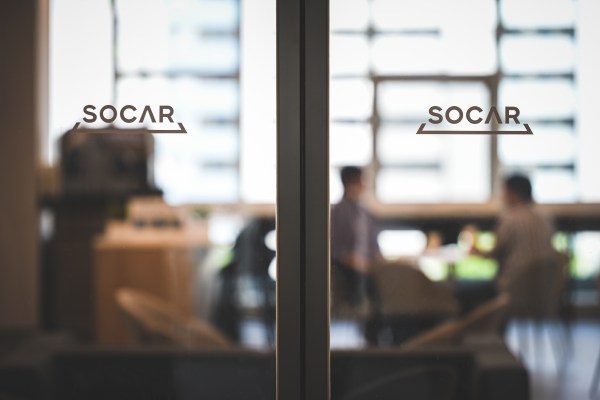Socar, South Korea’s largest car-sharing startup, tumbled in its Seoul stock market debut Monday even after pricing shares below the bottom end of a marketed range.
Shares of Socar rose 1.25% from its IPO price of 28,000 won ($21.10) in the initial minutes of the debut, before tumbling to 26,300 won and giving the firm a market cap of $642 million.
Last week, Socar cut its targeted IPO offering to 102 billion won ($78.1 million), giving the car-sharing company a valuation of 966.5 billion won ($731 million) before the start of trading.
Socar’s debut comes amid a sluggish period in the IPO market in South Korea that has prompted a series of Korean companies to delay their listing plans.
Analysts attributed the muted performance of Socar’s debut day to an expensive valuation and slowdown in the IPO market that is reeling from the global economic downturn.
Jaeuk Park, CEO of Socar, told TechCrunch earlier that the company was pushing ahead with its listing plans because it was confident in its performance and expected to generate both operating profits and net profits by the end of this year.
Rather than waiting for the stock market to recover for a higher valuation for the next two to three years, he said, the Korean mobility startup prioritized investment in organic/ inorganic growth with the IPO proceeds.
“First off, Socar’s growth is faster than expected in the face of re-opening [after the COVID-19 pandemic],” Park said. “The stock market is expected to be tough for the time being, but the mobility industry will grow rapidly that we can’t miss this critical time; we will focus on accelerating mergers and acquisitions and investments in new businesses and technology.”
The company plans to beef up its services and geographic expansion efforts via acquisitions to become a mobility super-app with the goal of posting 1 trillion won ($748 million) of revenue by 2025, up from 289 billion won last year, Park continued. It aims to reach 30% or more annual revenue growth by 2025, he added.
Socar, the first and only unicorn mobility startup in South Korea, aims to become the first listed profitable unicorn company, Park noted.
Socar, backed by SoftBank, and Korean strategic investor SK Inc, entered the unicorn club with roughly 183.2 billion won ($150 million) funding at a 1.3 trillion won (approximately $1 billion) in March from Lotte Rental, the rental car unit of South Korean Lotte Group. The startup raised a total of 379.7 billion won ($ 284.2million) since its inception in 2011 before its IPO.
The company’s major shareholders, including SoftBank, SK Inc, Lotte Rental and Altos Ventures, will hold their stake since they agreed to a lock-up period of up to six months.
The 11-year-old firm, which started the car-sharing service with 100 rental cars in Jeju, now manages a fleet of more than 19,000 vehicles across the country, offering services, including car-sharing, car-hailing, electric bicycle rental, parking, vehicle management and vehicle maintenance. It will launch its transportation super-app later this year, providing all-in-one mobility services. Additionally, Socar is building an ecosystem for future mobility, including an autonomous driving platform, charging stations service for electric cars and micro-mobility.
Park said in an interview that Socar wants to enter the Southeast Asia market with its new business, fleet management system (FMS) B2B SaaS service that it plans to begin selling later in the fourth quarter of this year. Socar, based on its 19,000 vehicles, has built the FMS technology that uses data such as vehicle location and surroundings to support effective monitoring and control systems, providing accurate information to drivers and management servers.
“FMS is different from car-sharing, which has been Socar’s flagship business for the past ten years, and if stabilized, it is a B2B SaaS that guarantees a high-profit ratio,” Park said.
Socar claims that the company has captured about 80% of the market share in South Korea, with more than 11.4 million users and 1.4 million monthly active users this year.
The Korean car-hailing company has set up Socar Malaysia, a 79% stake owned by SK Inc, and launched services in Malaysia in 2018 and Indonesia in 2020.
Socar was founded in 2011 by Lee Jae-woong, who co-founded South Korea’s largest internet portal operator Daum Communications; Daum merged into Kakao in 2014. Jaeuk Park, a serial entrepreneur, who founded VCNC, an operator messaging app for couples called Between, in 2011, sold VCNC to Socar in 2018. After the sale of VCNC, Park joined Socar’s chief strategy officer (CSO) to lead Socar’s ride-hailing business Tada and took on the chief executive officer (CEO) in 2020 after Lee stepped down.
Korean game maker Krafton acquired VCNC’s messaging app unit in May 2021, while Viva Republica, a Korean financial super app Toss operator, bought a 60% stake in Tada, the ride-hailing business of VCNC, for an undisclosed amount in October last year.
Meanwhile, South Korea’s TMap Mobility, whose investors include Uber Technologies and SK Inc’s investment firm SK Square, said Monday it has raised $149.2 million (200 billion won) from strategic investor KB Bank. Another Korean car-hailing platform Kakao Mobility, which also had planned an IPO between 2022 and 2023, said last week it has terminated its sale talk with Korean private equity firm MBK Partners.
